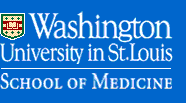


 |
 |
 |
|
|
Before the OR Fourth-year medical students learn critical skills prior to entering the operating room |
||||||||||
|

|
It's the first day of your surgical internship. A physician asks you to scrub in on a surgical case and suture the incisions when the procedure is complete, then leaves the operating room. Will your sutures be neat and straight? Will your knots be tied correctly? Most surgical interns face scenarios like this. But surgical interns who have earned their medical degrees from Washington University School of Medicine get a head start on such skills through the Accelerated Skills Preparation for Surgical Internship course, which just completed its second year. Open to 20 students planning to enter a surgical subspecialty, the course is designed to help them develop their technical skills before they begin their internships. "Students today can have a variable experience in terms of opportunities and exposure in medical school because of work-hour restrictions, time constraints, their rotation or institution," says L. Michael Brunt, MD, professor of surgery and coursemaster. "But it's very clear that surgical skills training outside of the operating room environment is increasingly important for graduate medical education, particularly residents."
Students discuss common problems they might face while on call — good preparation that will come in handy on their first day of residency. During the seven-week course, students use low-tech simulators to learn a variety of surgical skills, ranging from basic suturing and knot tying to more advanced techniques such as laparoscopy and surgical stapling. They also review the common problems arising from surgical patients and learn how to handle those issues while on call. "We want to get students to the point where they can hit the ground running when they start their internships and their hours and workload increase and there are many things to focus on," Brunt says. "This way they have an opportunity to learn in a low-key, nonpressurized environment with time to practice skills, and refine and develop them further in order to become better surgical residents." Mary E. Klingensmith, MD, associate professor of surgery and residency training director, also teaches in the course. She says it accelerates the students so that during their first year of surgical residency, they have mastered skills students from other medical schools may not have experienced. One session led by Valerie J. Halpin, MD, assistant professor of surgery, is titled 'On-call Management Problems,' in which students are encouraged to take additional overnight call from Barnes-Jewish Hospital, says Klingensmith. "It forces them to use what they've learned in the first four years of medical training and to make independent decisions about how they will manage acute patient care problems.
"This course puts our students ahead of the game," Klingensmith adds. "They are in a big transition in life. If we can help them with this aspect, they'll have the chance to be more successful surgeons than they otherwise might be." Julie Margenthaler, MD, assistant professor of surgery, agrees that the course provides students with a focused approach to the types of procedures, clinical issues and surgeries that they will encounter during their internships. "These are the types of learning experiences that most surgical interns gain on the job by trial and error," says Margenthaler. "Our students understand that learning the techniques in a classroom offers them an advantage." Students appreciate not only the extra practice they get before starting their internships but Brunt's efforts as well. "Dr. Brunt's dedication and the collaboration of the other surgeons who assist him are a testament to the commitment of the Department of Surgery to furthering undergraduate and graduate medical education," says Lola M. Fayanju, MD 07, who began a residency in general surgery at Barnes-Jewish Hospital this summer. "Although one can never feel completely ready for internship, I do feel a little less panicked now that I've completed these sessions." Gita N. Mody, MD 07, who also took the course this past spring, says it helped her become more aware of both her strengths and her weaknesses.
Brian M. Rapp, MD 07, assisted by Smita Sihag, MD 07, practices laparoscopic surgery skills on a simulator as L. Michael Brunt, MD, coursemaster of the Accelerated Skills Preparation for Surgical Internship course, looks on. "That will help me better use my skills and improve my focus on specific aspects of training during internship," she says. Mody began her residency in general surgery at Boston's Brigham and Women's Hospital in July. Amber Traugott, MD 06, is a surgical intern at Barnes-Jewish Hospital. She took the course last year and says it definitely helped her to feel less anxious before starting her internship. "One of the best things about the course is that it helps alleviate some of the anxiety you feel as a fourth-year medical student about to become an intern in surgery," Traugott says. "On your first day as an intern, no one is looking at your orders to co-sign on them, no one is going to check behind you. There is a fear that you're going to order the wrong thing or don't have the experience to judge when something is serious or not. The management aspects of the course are helpful in preparing you for that." Brunt says that assessment measures he has built into the course make it unique. Students are tested on various skills throughout the course, which allows the faculty to see improvement over time. In addition, he gives the students a survey at both the beginning and end of the course, asking them questions about their confidence levels and how prepared they feel for their internships. Across the board, students report that they feel more prepared to enter residency and that their ability to perform critical surgery skills has improved. "To have had this opportunity as students was a unique privilege and allowed us to develop confidence that will be evident as we start our future residencies," says Mody.
|
|||||||||